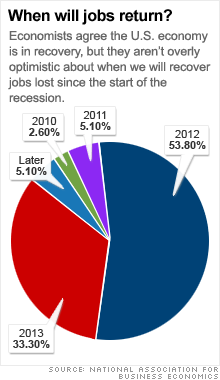Businesses get a break in unemployment bill
Companies will get to turn some of their losses into cash, thanks to a temporary expansion of an often used tax measure. To pay for it, another tax break will be delayed.

NEW YORK (CNNMoney.com) -- The unemployment insurance bill that President Obama signed Friday won't just help the jobless and the homebuyer. It also includes a long-awaited break for businesses that will let them quickly turn their recent losses into cold cash.
The bill will let all businesses apply their losses from either 2008 or 2009 to any five years prior to 2008. By doing so, they can get a refund from the IRS on the taxes they paid for those five years.
A loss is defined as the amount by which a company's tax deductions exceed its gross income.
Under current law, the so-called "net-operating loss carryback" is only allowed for two years.
There are only two restrictions to the new provision. The first is that no business that has accepted funding from the Troubled Asset Relief Program (TARP) would be eligible for the break. And the second is that any refunds for taxes in the fifth year would be reduced by 50%.
The provision is estimated to cost $10.4 billion over 10 years, according to the Joint Committee on Taxation.
Businesses have been angling for this break throughout the recession. And they expected it to come a lot earlier. A similar measure was proposed for inclusion in the $787 billion stimulus package passed in February. But it ended up being watered down so that only small businesses with gross revenue of $15 million or less could qualify.
While those small businesses represent about 98% of companies, they only represent roughly 5% of taxable income, said Clint Stretch, managing principal of tax policy at Deloitte, at the time.
Not surprisingly, the estimated cost of that provision in the stimulus bill was considerably lower, just under $1 billion.(Please see correction.)
While most businesses have suffered during the downturn, those in the hardest hit industries are going to enjoy the biggest break.
"The homebuilders and banks that have never taken TARP money are the most obvious beneficiaries," said Anne Mathias, director of research at Concept Capital's Washington Research Group, in a research note.
But she also noted others in line to benefit include semiconductor companies, materials companies, retailers and print media companies.
While an overwhelming majority of lawmakers voted for the overall bill, not all lawmakers are happy with the provision.
Calling it a "corporate giveaway, Rep. Lloyd Doggett, D-Texas, said, "This is a textbook example of how not to deal with the economic challenges facing our country," according to a CongressDaily report on Thursday.
A supporter of the provision, House Ways and Means Select Revenue Measures Subcommittee Chairman Richard Neal, D-Mass, said it would help businesses hard up for cash. "It will provide quick capital at a time when it is nearly impossible to find," Neal said.
One way the legislation seeks to pay for the cost of the tax breaks is to delay the implementation of a tax relief provision for multinational companies that was supposed to be enacted in 2011. Under the bill, it will now be enacted in 2018.
The tax relief measure is intended to create more of an incentive for multinationals to invest in the United States. And the way it is structured it would benefit financial services companies the most.
The delay in implementation is expected to raise $20.1 billion over 10 years, the JCT estimates.
Multinationals aren't happy about it but they haven't fought the measure because "they have bigger fish to fry," such as the potential loss of their ability to defer paying U.S. tax on income they haven't brought back to U.S. soil, said Joanne Thornton, director of international research at Concept Capital, in her research note.
There is also a possibility that the delay in the measure could become permanent in part because it will be a tempting revenue raiser to pay for other legislation.
The House health reform bill, for example, already calls for a full repeal of the multinational tax relief measure for a savings of $26.1 billion over 10 years.
Now, Thornton said, "there will be a $20.1 billion hole in the health care bill."
Anticipating that the unemployment bill would pass, House lawmakers have already proposed another measure to compensate, which potentially could raise nearly $24 billion. But they're still negotiating the legislative language and that could reduce how much the measure raises.
-- CNN's Deirdre Walsh contributed to this report
Correction:The original version of this article incorrectly stated the cost of the net-operating loss carryback provision for small businesses. ![]()

